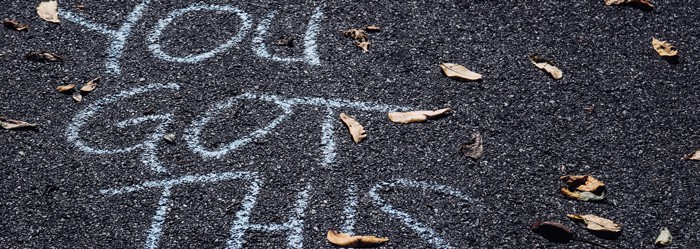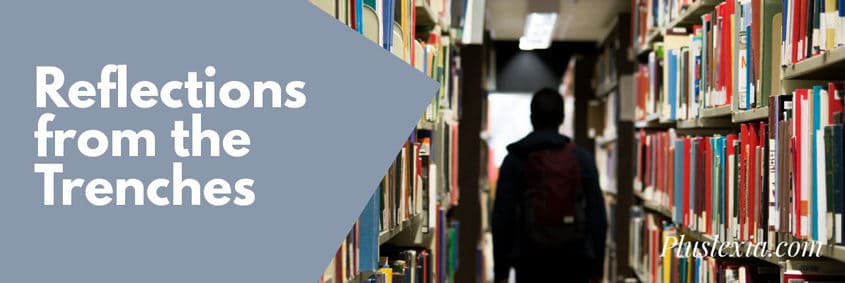Reflections from the Trenches
What makes a person a champion? Is it when a person gets an A+ on a tough exam, or is it always knowing the answer when the teacher asks a question, or is it when an athlete scores a touchdown to win the big football game? If these are what makes a person a champion, then some would say that I am a failure.
For many of my years in elementary and middle school, I thought that these characteristics were what made someone a champion and in doing so, I felt like a failure. I rarely succeeded in school during those years, and I often struggled with my schoolwork.
I always had the messiest artwork, and had trouble reciting my alphabet, spelling, and cutting out shapes. By the time grade three approached, I was told that I was at a reading level of a grade one student.
I had trouble with tying my shoes and would charm the girls in my class so they would tie my shoes for me. Despite my kindergarten teacher reassuring my parents that no one goes to junior high unable to tie his shoes, I did. When I was 13, I began to play football and still couldn’t tie my shoes. Unfortunately there was no cute girls on my football team, and I sure wasn’t going to ask one of the big offensive linemen to do it, so I’d often have to sneak out of the locker room before games to go find my mother to tie them for me.
I was labeled as lazy
Other aspects of education that I struggled with growing up included telling the difference between left and right, rhyming, reading, writing and concerns with letter and sound connections. Due to these issues, many teachers believed that I was lazy, and some even suspected that I’d never graduate from high school.
I was labeled as lazy, but they did not see the struggle I had in trying to read books or remember sequences. My classmates also labeled me as the “dumb kid” in the class, and over time I began to believe that I was “dumb.” When it came to group projects, I was often discriminated against in the class, as no one wanted “the dumb kid” in their group. This brought my confidence to an all time low, and I began to accept my fate as the “dumb kid.” I was destined to fail.
Took a leap of faith
My fate quickly changed when I entered the fifth grade, and I met my new teacher, Charlie S., who proved to be catalyst for change. He looked past all the previous labels people had given me. I had a strong interest in creative writing and newspaper writing at this point in time, and he let me create and become editor of our class newspaper.
This was a huge risk as my teacher was letting the student who everyone labeled as dumb run a monthly newspaper at the young age of ten. This was the first time that I felt like a leader to my peers. I was more confident than ever and it was all thanks to this one teacher for believing in me. I owe him a lot. If it were not for him, I may have never learned to believe in myself nor graduate from high school.
Confidence, up and down
The confidence that I had discovered in the fifth grade followed me into middle school, but middle school meant a whole new set of challenges, such as learning how to use a combination lock, exams, difficult course loads, and doing math without a calculator.

My confidence began to quickly drop again and my parents fresh from learning my younger brother had dyslexia decided to send me to a specialist to get some insight as to why I was struggling. I had seen specialists quite often during my early years, but it wasn’t until grade 8 that they discovered that I too had a learning disability. My parents sat me down and told me that I had dyslexia and my reaction to them was, “so you mean I’m not stupid.”
I’m not stupid?
For the majority of my life, I had felt stupid. I knew I was different from my peers, which made me feel that I was not as good as everyone else. My mom showed me a list of famous dyslexics, and I was surprised to see how many people I recognized on this list including Jay Leno, Albert Einstein, Tom Cruise, and Walt Disney. I felt that if these famous people could succeed despite their dyslexia, then I could too.
I discovered that being dyslexic didn’t mean that I couldn’t learn, it just meant that I had to take different approaches to learning. I am an auditory learner, which means I learn better through listening to a good speaker or through film.
Discovering I had dyslexia helped me gain self-confidence. As I was going through the assessment, I was also in the process of applying to St. Paul’s High School, a Catholic private school. I managed to work my way through the grueling entrance exam and got an interview.
Me applying for St. Paul’s was no secret to my classmates, so during one my basketball games, my mother was discussing the application process with another parent. During this conversation, an eavesdropping mother in front of her turned around and looked my mother dead in the eye and said “Matthew is applying to St. Paul’s?! He will never get in. St. Paul’s isn’t a place for a kid like him.”
I was not about to let this rude, insignificant woman shake my confidence. Just because I had dyslexia, didn’t mean I couldn’t do things; it just meant I would have to work that much harder to do them.
One of the first with learning disability
I was accepted to St. Paul’s High School, where I was greeted with caring and supportive teachers. They allowed me to embrace my dyslexia, rather than hide from it. I was given permission to write my exams on a computer so that I could organize my thoughts better and not have to deal with my fine motor difficulties. I was given more time on tests and exams, so that I could put more time and effort into my work.
I was told that I was one of the first students with a known learning disability to be admitted to the school. During my time at St. Paul’s I was never an honor role student, but that didn’t mean I didn’t succeed.
Lead role in a musical
I was given a lead role in a musical at St. Mary’s Academy where I was given the challenge of learning over thirty paragraphs to recite — quite the challenge for a kid who had trouble reciting the alphabet during my early years of education.

In my senior year of high school, I was in Advanced Placement English. The “dumb kid” who was told might not make it to high school, who was at a grade one reading level in grade three, and struggled with writing, succeeded in Advanced Placement English and ended up with a mark in the 80s!
The scars of our failures and what they have to teach us
When I was in the second grade, a girl punched me and knocked me out. I fell and smacked my head on a planter, and cut my face open. I had to get several stitches, and ended up looking like Sloth from The Goonies for a few weeks. However over time it healed, and all that is left from that fateful day is a little scar above my eye.
Being labeled as the dumb kid left a lot of wounds at the time that have become scars. The interesting thing about scars is that they’ll always be with you, but that doesn’t mean that they haven’t healed, in fact some of them make great stories.
Our society today is so based on success that we never really take a look at the scars of our failures and what they have to teach us. However, Life is often measured on how many times you fail and overcome that failure. When my favourite teacher, Charlie S. was retiring, I had the opportunity to publically thank him for teaching me to overcome failures and learn from them, and part of my speech has stayed with me over the years:
“Beethoven’s music teacher told him that he would never succeed as a composer. Walt Disney was fired from a newspaper because “he lacked imagination and had no good ideas.” Albert Einstein’s teacher told him that he was so stupid that he should quit school.
Almost every publisher in Great Britain and the USA rejected J.K. Rowling’s book, Harry Potter.These people were all told they would amount to nothing; they were labeled as failures but they did not let these labels define them. They worked through their hardships and became some of the greatest success stories of all time.“
Keep on going, don’t stop!
Dyslexia is a gift. If you are struggling with dyslexia, keep on going. Don’t use it as an excuse to not do something, because with hard work and faith in yourself you can do anything. Don’t let others ruin your confidence. Dyslexics have a unique outlook on the world. Just like how we learn differently, we see things differently. We are the future success stories of the world.
Stop beating yourself up about it
My advice to parents who are worrying about their kids with dyslexia is to believe in your children. They will get through this. If you are feeling guilty about not discovering your child had dyslexia sooner, you need to stop beating yourself up about it.

You discovered it now, and all you can do is continue to support your children. My parents wouldn’t accept that I was “lazy” or “dumb” and worked with me tirelessly all through my struggles. I was blessed to have the parents I have, and I know that I owe them a lot because without their faith in meI would not have succeeded.
My mom has often said that she felt so guilty that no one had discovered that I had dyslexia sooner, but it’s not anyone’s fault. I am happy now. I am confident now. Every great epic has obstacles to get to the happy ending.
Not a typical champion, but I am in no way a failure!
Did I ever get an A+ on a tough exam? Rarely. Did I always know the answer when teachers were to ask me a question? Sometimes. Did I learn to tie my shoes? Eventually. Did I graduate from High School? Yes.
In fact I recently just graduated from University and I’m now pursuing a career in both film and education. I spent a year as the Senior Stick (Student Council President) of St. Paul’s College, where I was able to re-launch a college newspaper, co-organize a quarter of a million dollar renovation, as well as many other successful projects.
This June, I spent a few weeks working as an Educational Assistant where I had the opportunity to prepare struggling learners for their exams. I was elated with their success because it was not all that long ago that I was in their shoes. If all goes as planned, I hope to one day be back in the classroom as a teacher where I can be a Charlie S. to kids who need someone who will believe in them.
I may not consider myself your typical champion, but I am in no way a failure!
By Matthew Semchyshyn – Dyslexiachampions.org




Leave a Reply
Want to join the discussion?Feel free to contribute!